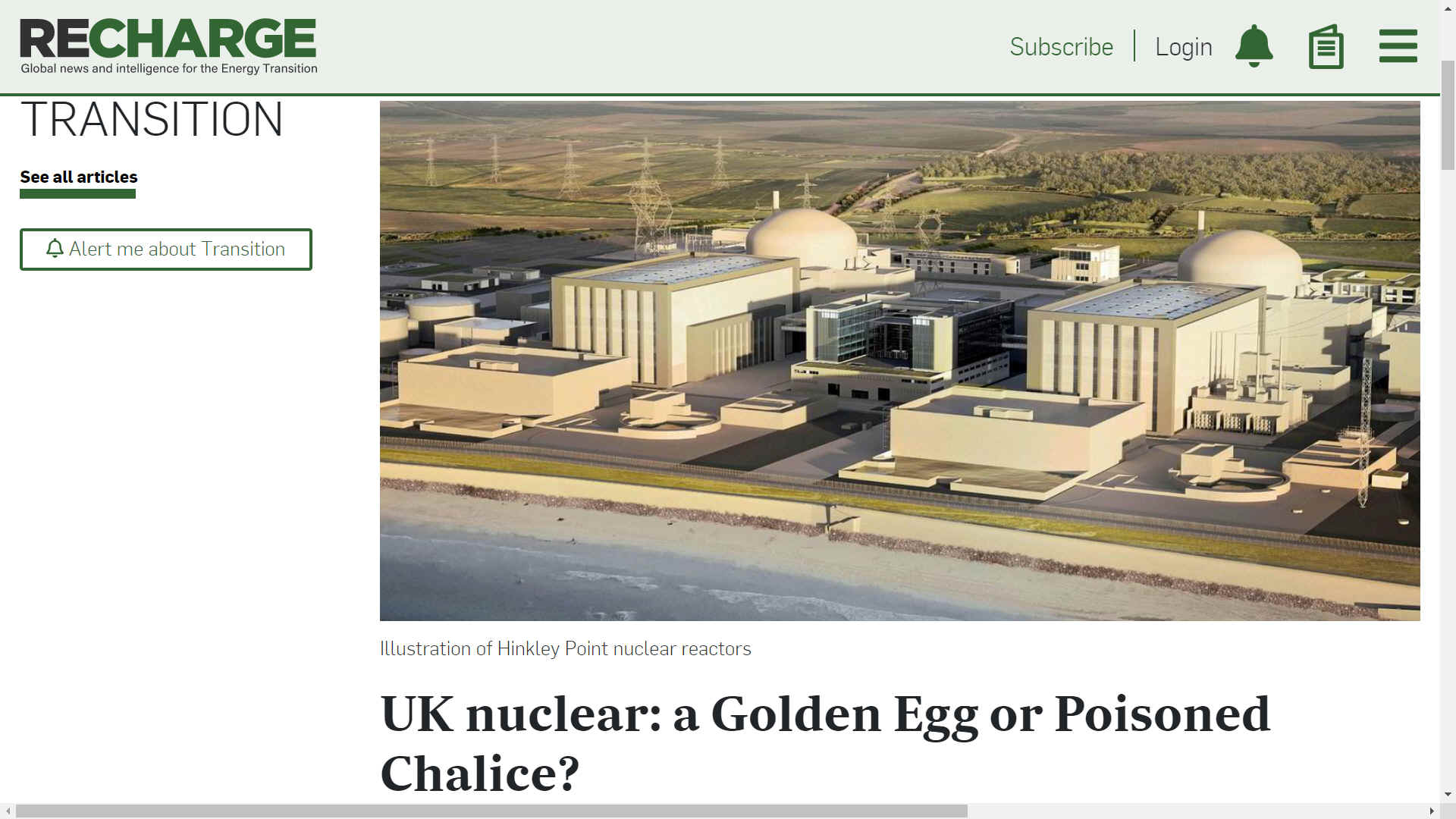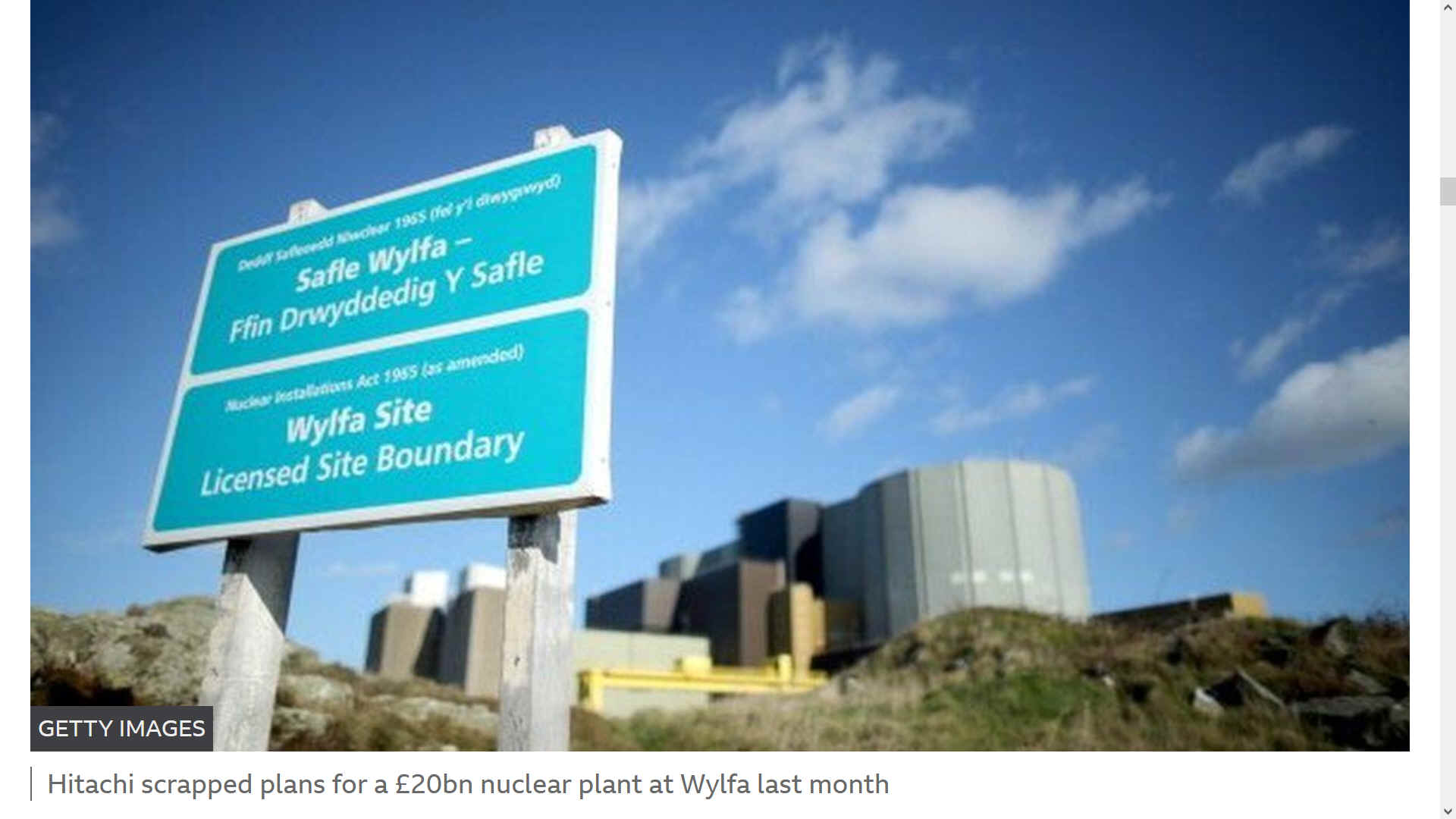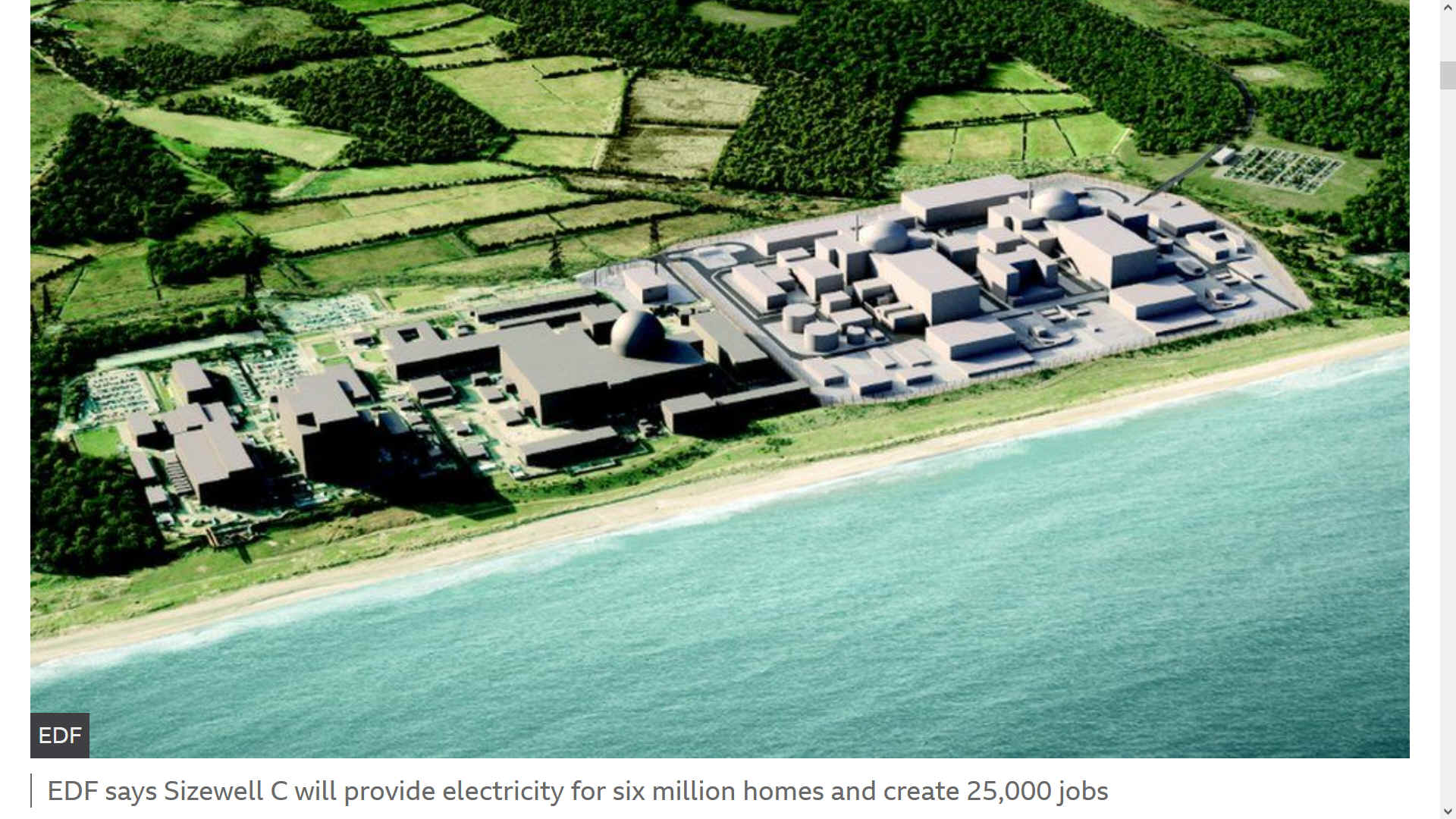|

INSECURE
WASTE - Cleanup costs are wild and nobody can guarantee over more
than a hundred years in the future, let alone one hundred thousand
years. What are they crazy. Indeed, present day corporations will seek to shift contracts
to third parties to escape liability, with no security bonds in place
should (and it will) that happen - because negligent governments (on the
take) are allowing them to escape such essential clauses - or the
projects would almost surely be deemed economically inequitable. In
other words, the taxpayer
will be footing the cleanup bill for the next couple of hundred
thousand years. Such burden in terms of taxes is unsustainable, adding to the
cost of nuclear energy by the back door. We propose that an
International Radiation
Tax should be introduced, to cover site MOTs Insurance against
nuclear accidents, and routine monitoring by independent Health &
Safety assessments and surveys.
RECHARGE
17 SEPTEMBER 2020
- 'No higher cost energy': nuclear has drained Germany of more than €1trn to date:
Subsidies tot up to €287bn since 1955, refuting atomic energy's cheap power myth, says Forum for Ecological-Social Market Economy study
Development of the nuclear energy industry since the mid-1950s has led to more than €1trn ($1.18trn) in costs to the German society, and is wrongly portrayed as an inexpensive power source, according to a study by the Forum for an Ecological-Social Market Economy (FÖS) estimated.
FÖS calculated the support, which includes both state support, power prices and external costs, had been the most draining of all energy sources on the finances of the country, which is Europe’s largest economy.
“No other energy source has caused costs as high as those of risky atomic power, which even after 65 years continues highly uneconomical,” said Sönke Tangermann, chairman of independent power provider Greenpeace Energy, which had commissioned the study.
Germany by the end of 2022 is phasing out nuclear power. Since a first reactor started operations in 1955, the country had built more than 100 nuclear facilities, including power and research stations, and waste deposits.
Other countries, such as Switzerland, have followed Germany's lead and will also phase out nuclear power, while France at least wants to diminish the share of atomic power in its energy mix.
But at the same time a new debate has started to build supposedly cheap mini nuclear reactors for power or hydrogen production. While none of these have been built yet, prices for the construction of conventional new nuclear plants in countries like France or Finland have ballooned into amounts several times the original cost estimate.
Direct and indirect German government subsidies alone, including research grants and tax credits, since the mid-1950s have added up to €287bn, FÖS has calculated. Another €9bn were spent on other costs for the state, such as police operations during anti-nuclear protests, or follow-up costs from nuclear operations in former Eastern Germany.
“Great part of these costs never had been included in the electricity price, which is why atomic energy wrongly was considered as a cheap power source,” Tangermann said, adding that the study for the overall costs of nuclear energy has included external costs that had been passed on to society for decades, such as the risk of accidents.
Even after Germany’s nuclear exit, the country will face high costs, such as at least €7bn for the rehabilitation of the Morsleben
nuclear storage facility and the Asse research storage facility as well as the Wismut uranium ore mine, or for the closure of former nuclear power plant sites.
Tangermann said he hopes Berlin will resist current demands for an extension of Germany’s nuclear power plants, or investments into new ones, also as those would serve to discredit the expansion of renewables.
“Given the enormous costs and aging infrastructure with ever greater risks, nuclear power cannot be a serious alternative to effectively tackling the climate crisis,” he said.

..
OCTOBER 2019
UK nuclear power is on a roller coaster ride with undue commercial pressures and political influence raising big questions over its future at a time when atomic energy is being increasingly undercut by renewables, according to a new book.
Rocketing costs and delays have beset the nuclear industry. French power company EDF revealed last week that the cost of building the Hinkley Point C nuclear station in southwest England would be up to £2.9bn ($3.5bn) more than budgeted, pushing the total project cost up to as high as £22.5bn.
This is in sharp contrast to the cost of offshore wind which has plummeted by a further 30% over the last two years with a raft of 12 projects in the government’s third Contracts for Difference auction last month recording record low prices between £39.65/MWh and £41.61/MWh.
Nuclear critics point out new offshore wind now costs less than half of the £92.50/MWh (at 2012 prices) that the government has committed to pay 35 years for power from Hinkley Point C, and that wind might get even cheaper by the time the much-delayed reactors finally crank into action.
The latest offshore wind prices confirm the trend and certainly makes the strike price for Hinkley Point C look expensive in comparison, the author says, but stresses that price is not the only aspect to be considered.
“Security of supply and diversity of generation sources are also relevant and, if we want to aim for 100% zero carbon generation, then that may not be achievable by relying on renewables alone.”
However, with the UK Conservative government’s plans for nuclear to be the backbone of a low-carbon energy system in disarray, the need for a firm policy towards the building and financing of new projects has never been greater.
In the past year, developers Hitachi and Toshiba have pulled out of building 9.4GW of planned nuclear capacity at Wylfa, Moorside and Oldbury, claiming that the prices being offered by the government were not high enough — leaving a giant hole in the country’s energy supply in the mid-2020s.
Plans for a further 7GW or so in the UK by 2030 are now looking unlikely, while 7.7GW of the country’s 8.8GW of ageing nuclear plants are due to be shut down by 2030.
It is said that the history of UK nuclear power could have been quite different had there been less secrecy, more openness and a greater willingness to objectively consider all the relevant evidence.

LONG TERM
INSECURITY
In
the short term we are reliant
on fossil fuels to take us into a
sustainable age where a circular economy is recognized as essential to
harmonious living. Long-term measures to increase energy security center on reducing dependence on any one source of imported energy, increasing the number of suppliers, exploiting native fossil fuel or renewable energy resources, and reducing overall demand through
energy conservation measures.
We
might also enter into international agreements to undermine fossil fuel energy trading
monopolies and assure that everyone has the right to cheap and clean
renewable energy, with the need to transport imports. Those
who held the power and wealth should consider re-investing in alternatives
as they head towards the sustainable blue
economics of zero growth.
The deployment of renewable
energy technologies increases the diversity of electricity sources and contributes to the flexibility of
an international infrastructure system of Hydrogen
Highways, and its resistance to central shocks,
especially where off-grid installations are widely deployed, but can be grid
connected.
It
is likely to be that at some point in the future we will no longer need
power stations that run on coal, oil
or nuclear fuels. We will have dragged ourselves out of the fossil
fuel cesspit and taken power generation from the fortunate few who
profit from geological deposits, to the masses who only need a space to
mount the harvesting medium for energy independence.
For those countries
whose reliance on imported gas is a significant energy security issue, renewable technologies can provide
a level playing field.
As the fossil resources that have been so crucial to human advancement start declining in numbers, countries will
be glad that they changed over to renewable energy. When it comes to decommissioning
a nuclear power plant, or when waste material escapes into the environment,
the nuclear lobby may want to think again. A Uranium Economy is a recipe for
disaster. Where critical mass in passive irradiation terms, could be
increased health risks in terms of cancer in later life.
FISSION
LINKS
& REFERENCE
https://www.rechargenews.com/energy-transition/record-global-renewables-build-points-to-eclipse-of-nuclear-and-fossils-by-2026-iea/2-1-1109952
https://www.rechargenews.com/energy-transition/atomic-giants-edf-and-rosatom-push-plan-to-sell-nuclear-powered-hydrogen-as-green/2-1-1002350
https://www.rechargenews.com/energy-transition/record-global-renewables-build-points-to-eclipse-of-nuclear-and-fossils-by-2026-iea/2-1-1109952
https://www.rechargenews.com/energy-transition/atomic-giants-edf-and-rosatom-push-plan-to-sell-nuclear-powered-hydrogen-as-green/2-1-1002350
CHAPTERS
| CHARACTERS
| MEDIA
|
MOVIE REF |
SCREENPLAYS
|


